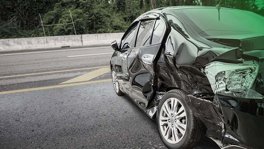Our Road Traffic Accident team supported a woman who was seriously injured after being hit by a car whilst out walking her dog. To protect her privacy, we’re referring to our client as Mrs A.
Her case involved complex medical evidence, overseas travel by medical experts, and a lengthy legal process following what had been a deeply traumatic experience. We worked closely with her throughout, making sure she had the support she needed at every stage. After a detailed investigation, we were able to secure a settlement of £830,000 to help meet her long-term needs and give her some stability for the future.
What happened
Mrs A, a pensioner, was out walking her dog on a familiar route when a car unexpectedly mounted the pavement from behind and struck both her and her pet. The impact killed her dog instantly and left Mrs A unconscious at the scene.
The driver fled without stopping, leaving Mrs A with serious injuries. Emergency services took her to the hospital where she remained for two weeks, receiving treatment for multiple injuries. These included a skull fracture, a brain haemorrhage, a fracture to her eye socket and a shoulder injury.
Although the driver left the scene without stopping, a police investigation later confirmed who they were. In the UK, leaving the scene of a road incident without checking on those involved or giving your details is a criminal offence. It’s often referred to as a “hit and run”.
In this case, the driver did not stop to check on Mrs A or her dog, but they were eventually identified. This meant we were able to bring a civil claim directly against them. A civil claim is the legal process used to claim compensation after someone has been injured or suffered a loss because of someone else’s actions. It’s separate from any criminal case the police may investigate.
Whilst a criminal case is about punishing someone for what they’ve done wrong, a civil claim focuses on helping the injured person get financial support to recover and move forward.
If the driver had not been identified, or if they hadn’t had valid insurance, we would have needed to make the claim through the Motor Insurers’ Bureau (MIB). The MIB is a UK organisation that helps people claim compensation when the driver at fault is either uninsured or cannot be traced.
But because the driver in Mrs A’s case was found and insured, we were able to deal with the claim directly. This allowed us to concentrate on getting Mrs A the support and compensation she needed to begin rebuilding her life.











